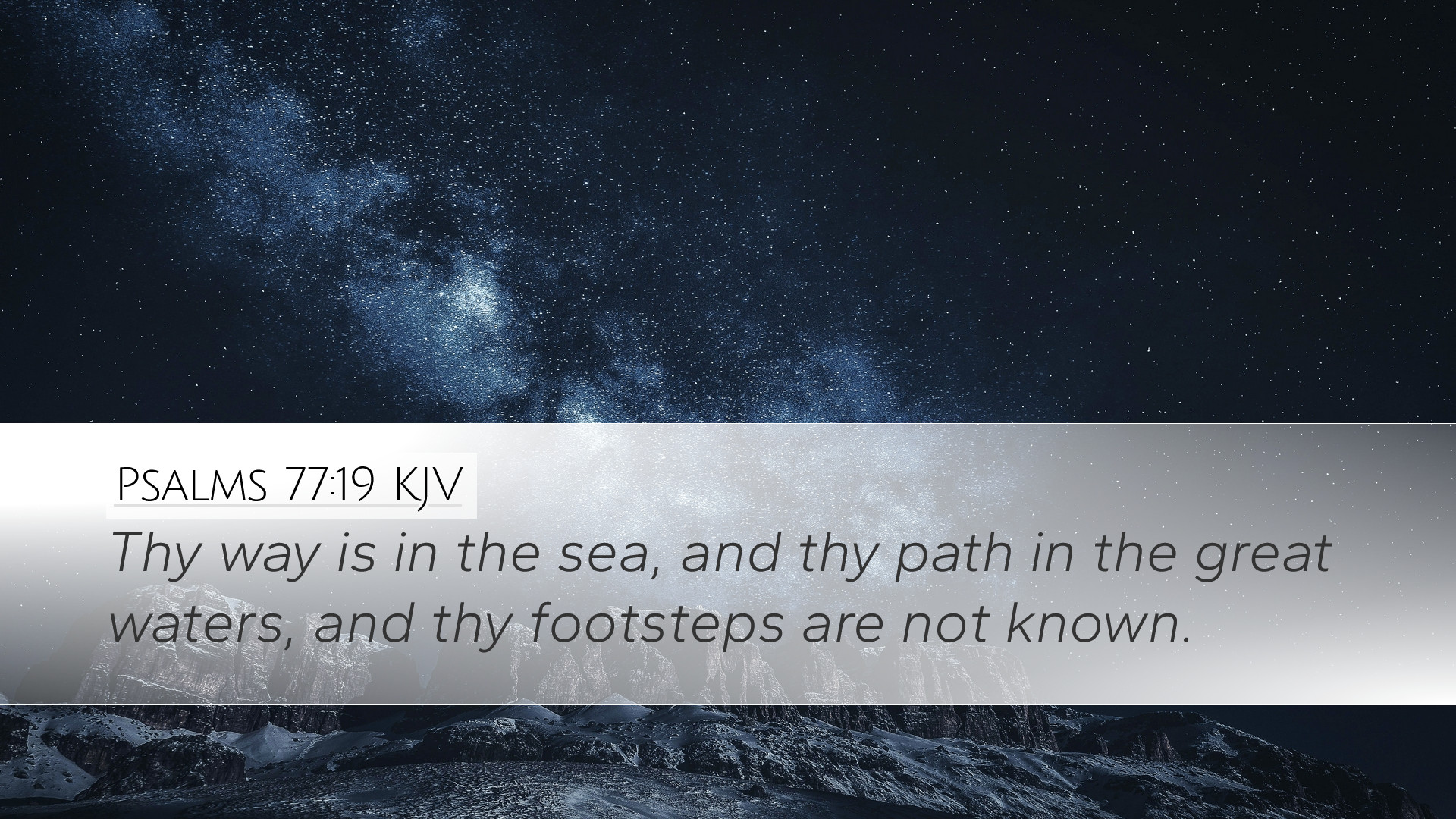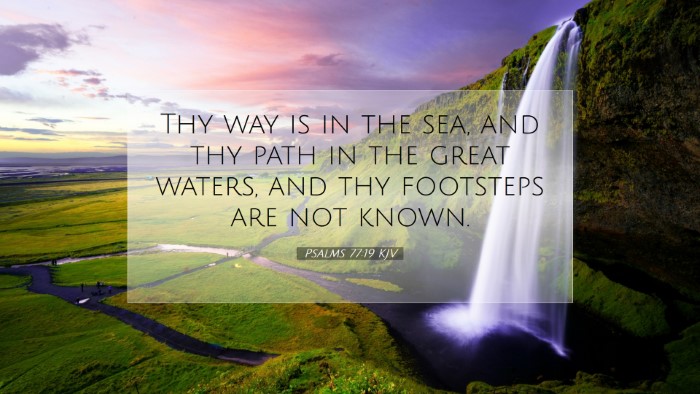Psalms 77:19 Commentary
Verse: "Thy way is in the sea, and thy paths in the great waters, and thy footsteps are not known."
Introduction
The Book of Psalms stands as a profound source of divine wisdom and human experience, effectively bridging the temporal with the eternal. Psalm 77, attributed to Asaph, is a poignant reflection on distress, a search for understanding in the midst of suffering, and an affirmation of faith despite perplexity. The verse presents a complex imagery of God's way intertwined with nature, particularly the sea, symbolizing mystery and the unfathomable depths of divine providence.
Contextual Analysis
Understanding this verse requires an exploration of the surrounding text within Psalm 77. The Psalmist begins by expressing deep anguish and anguish over his plight, feeling abandoned by God (Psalm 77:1-9). This sets the stage for the declaration in verse 19, where the recognition of God's ways diverges into the complexities of His governance and the inscrutable nature of His actions.
Commentary Insights
Matthew Henry
In his commentary, Matthew Henry reflects on the idea that God's ways often seem hidden or incomprehensible to us, especially when we are enveloped in troubles. He notes that although God’s path may lead through the chaotic realm of the sea, it ultimately guides us toward safety and redemption. The imagery of the sea reinforces the notion of God's omnipotence, navigating through tumult while remaining in control. Henry emphasizes that while the believer may feel as though they cannot trace God’s footsteps due to circumstances, they can trust that God’s purpose remains steadfast and purposeful.
Albert Barnes
Albert Barnes provides a detailed analysis of the metaphorical language employed in this verse. He interprets "Thy way is in the sea" as indicating that God's methodology of leading His people may sometimes involve tumultuous and perplexing paths. Barnes highlights that the "great waters" symbolize trials and adversities through which God’s providence operates. This suggests that what appears as a storm to human eyes is, to God, simply a means of fulfilling His divine will. Barnes underscores the importance of faith in believing that, despite the obscurity, God is actively working in the lives of His people.
Adam Clarke
Adam Clarke, in his thorough commentary, emphasizes the serenity and sovereignty of God in the midst of chaos. He suggests that the paths of God may lead through areas that seem seemingly impassable, like the depths of the ocean. Clarke interprets “thy footsteps are not known” not as an absence of God, but rather as an indication of our limited understanding of His ways. He points out that the Psalmist, despite expressing despair, ultimately shifts focus from distress to reverence for God's inscrutable wisdom, recognizing that every trial is a testimony of divine oversight.
Theological Implications
This verse invites critical reflection on several theological themes:
- The Sovereignty of God: The imagery implies that God's plans are executed even in environments that are confusing to human understanding. His authority extends over nature and life’s events.
- Human Limitations: The verse accentuates human limitations in comprehending divine action, highlighting the necessity of faith in trusting God’s perfect plan at all times.
- Hope in Despair: Amid despair, the acknowledgment of God’s mysterious ways serves not as a cause for anxiety, but as a source of hope that He is actively involved in guiding the faithful through trials.
- Faith Amid Confusion: Despite the obscurity of God's oeuvres, believers are called to maintain faith, knowing that God’s overarching purpose is much larger than individual strand experiences.
Practical Applications
For pastors, theologians, and scholars, this verse presents several practical applications:
- Encouragement in Trials: The message found in Psalm 77:19 can be used to provide comfort to congregations undergoing trials. Emphasizing that God's ways may be hidden but they are purposeful can create spaces for congregational reflection on their situations.
- Teaching on Faith: This verse can serve as a foundation for teachings on greater reliance on faith rather than mere understanding, leading towards deeper discussions on the nature of trust in God through trials.
- Leadership during Crisis: For church leaders, it may promote a model of leadership that exemplifies reliance on God despite apparent chaos, helping to guide congregants through periods of ambiguity.
- Encouragement for Personal Devotion: This Psalm encourages individuals to meditate upon God's greatness and devotion, even when personal experiences defy clear understanding of His workings.
Conclusion
The message of Psalm 77:19 encapsulates the essence of divine mystery within the human experience of suffering. By linking the divine way with the chaotic elements of nature, the Psalmist invites readers to embrace a faith that transcends understanding. As we navigate the often-turbulent waters of life, we are reminded that God walks alongside us, His paths filled with purpose, even when His footsteps are obscured. This fundamental truth resonates powerfully within the realms of theology, pastoral care, and personal faith, urging a deeper trust in God’s sovereignty.


